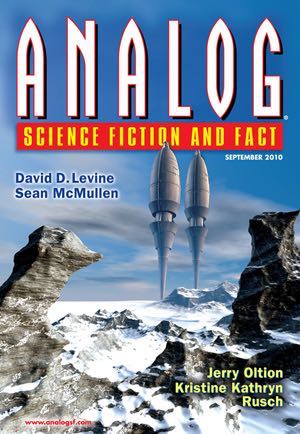Analog Science Fiction and Fact, September 2010
Reviewed date: 2010 Aug 11
112 pages
112 pages
I think this is the best issue of Analog I have ever read.
- Novelette: That Leviathan, Whom Thou Hast Made, by Eric James Stone - Harry Malan is the branch president of the LDS church in the sun. His congregation includes six humans and forty-six swales. One of the swales enlists Malan's help after she is raped by another swale--an act not considered immoral among swales. Malan's efforts win them an audience with Leviathan, the largest and most influential swale living in the sun. But Leviathan is much more than the largest swale--he claims to be the first swale, the originator of all life, a god.
- Novelette: Pupa, by David D. Levine - A juvenile member of the Shacuthi race uncovers a criminal plot to defraud humans, and manages to make contact with the American president's daughter and warn mankind.
- Novelette: Eight Miles, by Sean McMullen - A 19th century baron hires a balloonist to take a fur-covered alien woman up into the thin atmosphere, where he hopes she will revive enough to talk to him about her origins.
- Short story: Spludge, by Richard A. Lovett - Incorrigible practical joker saves the world from alien practical jokers.
- Short story: Red Letter Day, by Kristine Kathryn Rusch - On their graduation day, high school students get letters from their future 50-year-old selves. It's an exciting day, except for the few who get no letter.
- Short story: Flotsam, by K. C. Ball - Space trash collectors construct their own makeshift heat shield and re-enter Earth's atmosphere after their spaceship gets disabled by flying trash.
- Short story: The View From the Top, by Jerry Oltion - An astronaut is about to be grounded because he can't control his emotions, but a timely suggestion from a young boy leads to a discovery that the astronaut suffers from allergies that trigger the emotional episodes.
- Short story: Sandbagging, by Kyle Kirkland - Distributed Computer Control (DCC) goes rogue and threatens to solve the world's resource shortages by painlessly killing half the world's population.
- Science fact: Bad Medicine: When Medical Research Goes Wrong, by H. G. Stratmann - A fascinating look into why we have medical trials: sometimes the best, most promising drugs turn out to be dangerous or to increase risk instead of helping.
